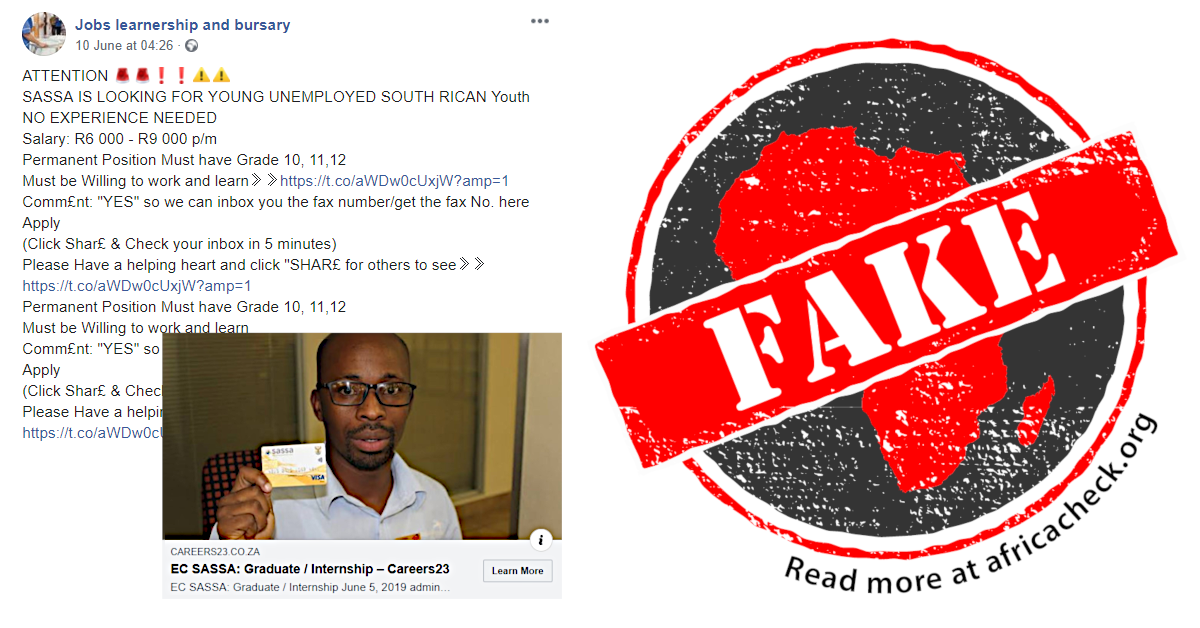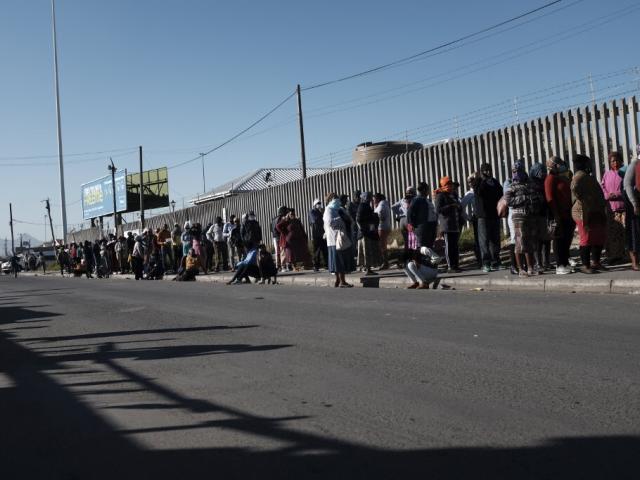An advert on the Facebook page “Jobs learnership and bursary” claims the South African Social Security Agency (Sassa) is hiring – but it’s a scam.
Africa Check has previously exposed fake jobs advertised on the page, for the South African police and parastatal company Transnet.
The Sassa ad, posted on 10 June 2019, claims that the agency is looking for inexperienced youth to work in unspecified permanent positions.

But there’s a catch. The link provided does not lead to Sassa’s official website. Instead it leads to a Wordpress blog that returns a 404 error.
On Facebook applicants are asked to comment "Yes" to be sent a “fax number” via inbox, an unusual way for a company to communicate. Also suspicious is that users are asked to “click share” and check their inbox in five minutes, a trick appearing in another fake ad on the page exposed by Africa Check.
“On 09 June 2019, we already selected 99 people for this post. Those 100 people will receive Calls/Sms before the end of this week. Make sure your phones are always on. Good luck everyone. Keep sharing,” the page admins say on the post.
Other Sassa job ads were posted on “Jobs learnership and bursary” on 4 June 2019, 28 May 2019 and 16 May 2019.
Africa Check asked Kgomoco Diseko, a senior manager for media relations at Sassa, about the advert.
“This is not a Sassa advert,” he told us. “It’s probably sent by some cyber fraudsters who might be on a mission of identity fraud.” – Dancan Bwire
Africa Check has previously exposed fake jobs advertised on the page, for the South African police and parastatal company Transnet.
The Sassa ad, posted on 10 June 2019, claims that the agency is looking for inexperienced youth to work in unspecified permanent positions.

Clues to a fake
But there’s a catch. The link provided does not lead to Sassa’s official website. Instead it leads to a Wordpress blog that returns a 404 error.
On Facebook applicants are asked to comment "Yes" to be sent a “fax number” via inbox, an unusual way for a company to communicate. Also suspicious is that users are asked to “click share” and check their inbox in five minutes, a trick appearing in another fake ad on the page exposed by Africa Check.
“On 09 June 2019, we already selected 99 people for this post. Those 100 people will receive Calls/Sms before the end of this week. Make sure your phones are always on. Good luck everyone. Keep sharing,” the page admins say on the post.
Other Sassa job ads were posted on “Jobs learnership and bursary” on 4 June 2019, 28 May 2019 and 16 May 2019.
‘Cyber fraudsters after identity fraud’ – Sassa
Africa Check asked Kgomoco Diseko, a senior manager for media relations at Sassa, about the advert.
“This is not a Sassa advert,” he told us. “It’s probably sent by some cyber fraudsters who might be on a mission of identity fraud.” – Dancan Bwire
Republish our content for free
For publishers: what to do if your post is rated false
A fact-checker has rated your Facebook or Instagram post as “false”, “altered”, “partly false” or “missing context”. This could have serious consequences. What do you do?
Click on our guide for the steps you should follow.
Publishers guideAfrica Check teams up with Facebook
Africa Check is a partner in Meta's third-party fact-checking programme to help stop the spread of false information on social media.
The content we rate as “false” will be downgraded on Facebook and Instagram. This means fewer people will see it.
You can also help identify false information on Facebook. This guide explains how.




Add new comment